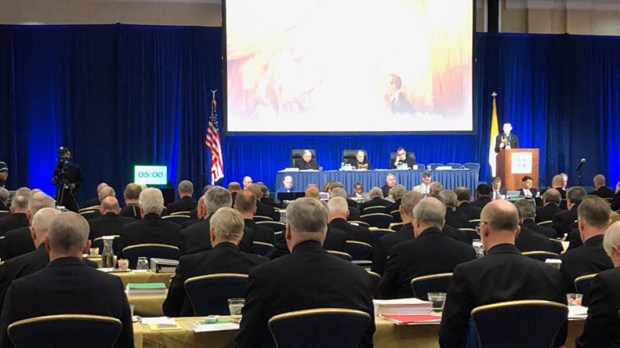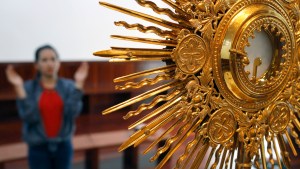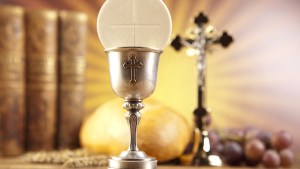As survey after survey present bleak news for the state of Christianity in the United States, the Catholic bishops of America are set to take up discussion on the central aspect of the Catholic faith.
The last time the United States Conference of Catholic Bishops met, in June, 75% of its members voted to draft a document on “Eucharistic coherence,” the idea that those who receive the Eucharist should be in communion with Church teaching.
Now, that document is ready, reportedly, and the USCCB will discuss and vote on it during its fall general assembly in Baltimore next week. Because a text of the document, dated September 24, was leaked to several media outlets earlier this month, many Catholics have already gotten an idea of what the bishops will be voting on.
According to the leaked draft, the statement delves into the theology of the Eucharist and reaffirms traditional Church teaching that anyone in the state of mortal sin may not receive Communion.
Surveys about the faith of Catholics and others in recent years seem to support the decision of Catholic bishops to launch efforts to revive the faith of their flocks. On Monday, the Catholic website known as the Pillar released findings reiterating that a growing number of Americans say they have no religious affiliation and that only 35% of Americans attend religious services on a weekly basis.
“And 28% of Americans say they have a different religious identity than the one in which they were raised,” the Pillar said.
Recently, a survey by the Springtide Institute found that just 16% of young people (13-25) identify as Catholic. Twenty-two percent consider themselves “just Christian,” while 16% identify as Protestant. The categories Atheist, Agnostic, and Nothing in Particular received 8% each.
The survey that really got the bishops’ attention, reportedly, was a 2019 Pew study showing a drastic drop in Catholics’ belief in transubstantiation, a central doctrine concerning the Eucharist.
Eucharistic revival
The bishops’ proposed statement on Eucharistic coherence is only part of what they foresee as a “Eucharistic revival” in the U.S. That revival is now in its planning year, Bishop Andrew H. Cozzens, a key member of the committee charting its course, told Aleteia.
“The first year will focus on those who are currently most engaged; the second year, on inviting those who are less engaged but practicing. And the third year will focus on reaching out to the disaffiliated or those on the margins,” said Bishop Cozzens, a midwestern bishop who chairs the USCCB’s Committee on Evangelization and Catechesis.
He said that another of the topics on the agenda for discussion and vote at the U.S Bishops’ fall general assembly in Baltimore, November 15-17, is a national Eucharistic Congress in 2024.
“During the meeting, I will give a presentation to my brother bishops and invite discussion on it, and then we will vote on it,” Bishop Cozzens said. “I see the national event as an essential part of the revival to send the missionaries to the peripheries.”
Traditional Catholic teaching
As for the statement on Eucharistic coherence, parts of it seem to address a concern that many Catholics have expressed — the proper response to political leaders who, on the one hand, don’t mind being lauded for their Catholic positions on some issues, such as care for the poor, but boldly take an opposing stand on others, notably, abortion. But the statement does not specify any particular persons, such as President Joseph R. Biden, America’s second Catholic president, or House of Representatives Speaker Nancy Pelosi, both of whom consistently fight to keep abortion legal and resist legislative efforts such as keeping tax revenues from going to pay for abortions.
The statement explains that the laity — Catholics in communion with the Church — have a part to play in public life.
“It is the role of the laity in particular to transform social relations in accord with the love of Christ,” the draft document says. It goes on to quote the so-called Aparecida Document from the V General Conference of the Bishops of Latin America and the Caribbean: “Lay people, ‘conscious of their call to holiness by virtue of their baptismal vocation, have to act as leaven in the dough to build up a temporal city in keeping with God’s project. [Consistency] between faith and life in the political, economic, and social realm[s] requires formation of conscience, which translates into knowing the Church’s social doctrine.’ Lay people who exercise some form of public authority have a special responsibility to embody Church teaching in their service of the common good.”
The document also restates something the U.S. bishops conference declared in 2006:
If a Catholic in his or her personal or professional life were knowingly and obstinately to reject the defined doctrines of the Church, or knowingly and obstinately to repudiate her definitive teaching on moral issues, however, he or she would seriously diminish his or her communion with the Church. Reception of Holy Communion in such a situation would not accord with the nature of the Eucharistic celebration, so that he or she should refrain.
“A person who receives Holy Communion while in a state of mortal sin not only does not receive the grace of the sacrament, he or she commits the sin of sacrilege by failing to show the reverence due to the sacred Body and Blood of Christ,” the current statement says.
It adds, “Reception of Holy Communion in such a situation is also likely to cause scandal for others.”
Though the proposed statement acknowledges that the decision to refrain from receiving Communion is often best left to the individual’s conscience, it recognizes that there are times when the Church herself must speak out. Quoting Pope John Paul II, it says, “In cases of outward conduct which is seriously, clearly and steadfastly contrary to the moral norm, the Church, in her pastoral concern for the good order of the community and out of respect for the sacrament, cannot fail to feel directly involved. The Code of Canon Law refers to this situation of a manifest lack of proper moral disposition when it states that those who ‘obstinately persist in manifest grave sin’ are not to be admitted to Eucharistic communion.”
The new document says it is meant to be a starting point for further reflection by the Catholic community. “What is most important is that we enter more deeply by faith and love into this great Mystery of Mysteries,” it says. “Let us all ask the Lord to call us into a time of Eucharistic renewal, a time of prayer and reflection, of acts of charity and sincere repentance.



